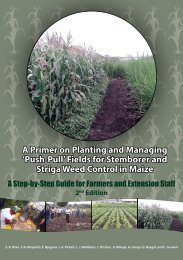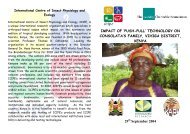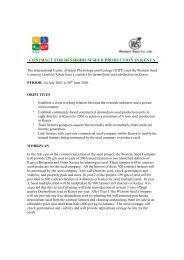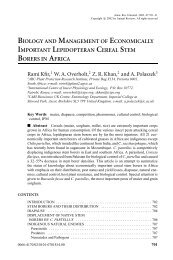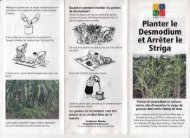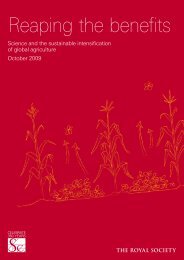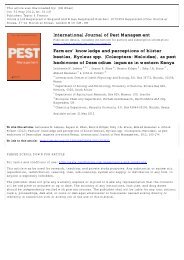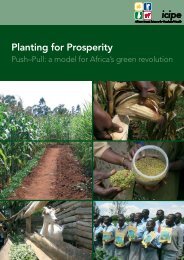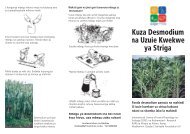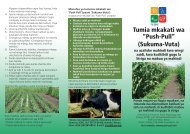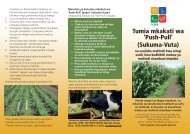Genetic engineering versus organic farming. - Push-Pull
Genetic engineering versus organic farming. - Push-Pull
Genetic engineering versus organic farming. - Push-Pull
You also want an ePaper? Increase the reach of your titles
YUMPU automatically turns print PDFs into web optimized ePapers that Google loves.
Hardy Vogtmann, Honorarypresident IFOAM, Head of theGerman Federal Agency ofNature Protection (BfN):"The 'green biotechnology' pretendsto be eco-friendly andto reduce the chemical input.I'm sceptical. Our future lies indecentralised and <strong>organic</strong>solutions."<strong>Genetic</strong> <strong>engineering</strong> is not a precise technology:there is no means of inserting a gene into a specificposition within the host cell. The genes end upin random locations. But genes do not operatein isolation, they interact with each other.The inserted genes may disrupt vital other genes,they might affect neighbour relationships, theymight disturb vital interactions. Possibly no acutetoxic food will enter the market, but nobodycan predict possible harmful long-term effects.According to scientists, GM-food might have thefollowing harmful effects:• Allergenic and immune system reactions to thenew substances contained in GMOs• Antibiotic-resistant genes, often used in genetic<strong>engineering</strong>, could be transferred to pathogensin the gut. Disease triggered by these pathogenscould no longer be treated with these antibiotics.• New genes could alter the expression of nativegenes and so may have unexpected secondaryeffects.11. What are the ecologicalconsequences of GMOs releasedinto the environment ?GMOs are living beings, they can spread andpropagate. They can pass their foreign genesto wild species. Once released, it will be virtuallyimpossible to recall genetically engineeredorganisms back into the laboratory. We are openingPandora’s box.Some possible negative consequences for theenvironment include:• Pollen from genetically engineered plants cancontaminate wild species.• Resistance amongst pests and diseases candevelop.• Soil organisms may be adversely affected byGM- crops. Toxic Bt has been found to persistin the soil for months, thus causing potentialdamage to soil-food-webs.• Fish are being engineered to grow fast andincrease in size. Giant GM-fish, having escapedfrom fish farms, may out-compete or even makenative species extinct.• Bacteria and viruses are genetically manipulatedfor a wide range of traits. If they escape or ifthey are released to the environment, theycould have even worse ‘side-effects’ than plantsand animals, because they reproduce and mutatemuch faster.12. Where do patentscome in ?In former times, nobody thought of patenting plants,animals or human genes and cells. No one thoughtit could be possible that an animal or a humangene might ever be considered as an ‘invention’ orMae Van Ho, Professor of biologyat the open University,GB:"I'm a scientist who loves scienceand believes science and technologycan help build a betterworld and combat world hunger.But it must be the right kind ofscience and technology, and it mustbe decided by people themselves.Nature is interconnected anddynamic. But proponents of genetic<strong>engineering</strong> got stuck in theage of mechanics - the technologyis just not innovative enough!"



